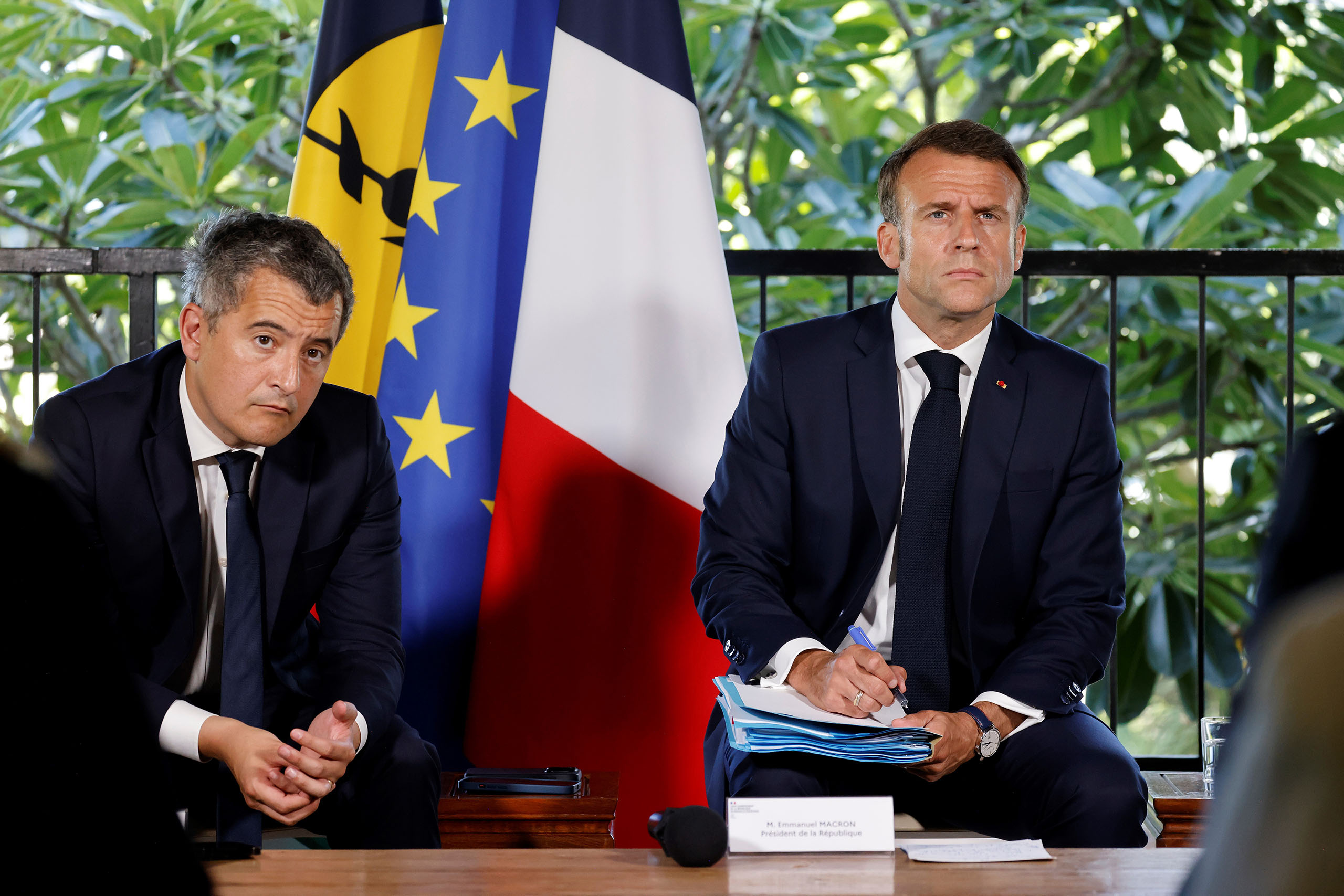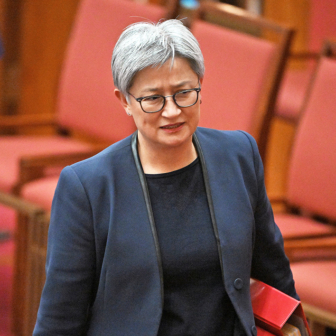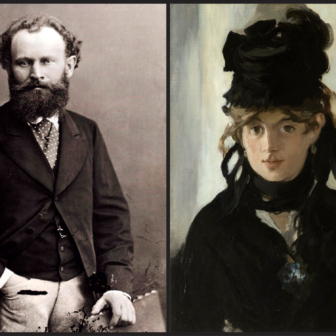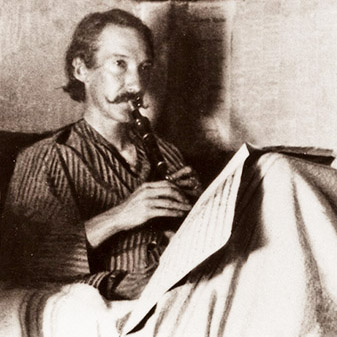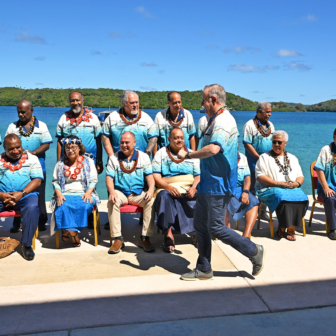As a stunt, French president Emmanuel Macron’s trip to New Caledonia captured headlines around the world. But it failed to achieve the breakthrough needed to restart the stalled dialogue between supporters and opponents of independence in the French Pacific dependency.
Macron’s 16,700 kilometre trip to Nouméa came in response to ten days of riots and clashes between protestors and police in New Caledonia. Having declared that “the return to peace, calm and security is the top priority,” he hosted a roundtable at the French high commission on Thursday this week, then a series of separate, bilateral meetings with key New Caledonian politicians, including the New Caledonian president, the presidents of its Congress and provincial assemblies, and locals mayors — along with twenty business leaders.
As he left for Paris, Macron pledged economic support for reconstruction: “The damage is being quantified. It is colossal. The priority will be emergency aid. In the coming days we will develop a solidarity fund for businesses.” But his final press conference was long on rhetoric and short on any concrete commitment to resolve longstanding differences between supporters and opponents of independence.
In his parting speech, Macron acknowledged the failure of his government’s attempt to ram through the controversial voting changes that triggered the riots. Back-pedalling from previous tough talk in Paris, he now said, “I am committed to ensuring that the proposed reform to ‘unfreeze’ the electorate will not pass through force, and that we will give ourselves a few weeks to start a resumption of dialogue.”
But he has not formally withdrawn the contentious legislation, which has already passed the French Senate and National Assembly. The law could still be sent later this year to a joint sitting of both houses of parliament, known as the Congress of Versailles, to amend the French constitution.
The limited backdown on electoral change brought little comfort to Roch Wamytan and other leaders of the Front de Libération Nationale Kanak et Socialiste, or FLNKS. “The question we are asking,” said Wamytan, who serves as president of the Congress of New Caledonia, “is will the constitutional revision text be withdrawn, to clear the way for in-depth discussions?”
The current French government bill could add 25,000 extra voters to electoral rolls for the three provincial assemblies and the national Congress, a potential increase of 15 per cent in the number of people defined as New Caledonian citizens. By allowing larger numbers of recent settlers to vote, the change would shift the electoral balance away from indigenous Kanak voters.
Many FLNKS leaders have accepted the need for electoral reforms (especially for locally born citizens), but only as part of a comprehensive agreement that deals with longstanding demands. In March, FLNKS spokesperson Pascal Sawa said that talks with other political parties in 2022–23 had developed “many points of convergence, but the work is not finished and therefore the unfreezing of the electoral rolls must be part of a global agreement.”
Calling on all political leaders to rapidly agree on a new statute to replace the 1998 Nouméa Accord, Macron suggested that “my wish is also that this agreement can be submitted to the vote of New Caledonians.” But he made no commitment to a further referendum on self-determination, which has been a central demand of FLNKS negotiators during recent talks.
The president’s rhetoric on dialogue dodged the specific call from the FLNKS for “a mediation mission led by a high-level dignitary, in order to guarantee the impartiality of the French State and to open a new phase of discussion.” Instead, Macron named three senior public servants as contacts for continue dialogue; each has experience and knowledge of New Caledonia’s complex politics, but they are hardly independent.
In a statement last week, Vanuatu prime minister Charlot Salwai, who chairs the Melanesian Spearhead Group, stressed that “there is an urgent need now for France to agree to the proposal by the FLNKS to establish a dialogue and mediation mission, to be led by a mutually agreed high personality, to discuss a way forward so that normalcy can be restored quickly and an enduring peace can prevail.”
His call for independent mediation was echoed by the chair of the Pacific Islands Forum, Cook Islands prime minister Mark Brown. “The Pacific Islands Forum stands ready to facilitate and provide a supported and neutral space for all parties to come together in the spirit of the Pacific Way,” he said.
Many Kanak activists were dismissive of Macron’s visit, especially given his professed aim of restoring “Republican order.” This tone-deaf language highlights a crucial problem: “Republican order” lies at the very heart of the New Caledonia crisis. Leaders across the political spectrum want an end to violent clashes, but significant numbers of New Caledonians, including the overwhelming majority of Kanak, no longer want to be part of the French Republic.
The impasse is intensified by the FLNKS leaders’ lack of trust in France’s overseas minister Gérald Darmanin, armed forces minister Sébastien Lecornu (who, as overseas minister, was responsible for the contentious 2021 referendum on self-determination) and other key government ministers. Yet Macron was pointedly flanked by Lecornu on his right hand and Darmanin on his left at the high commission on Thursday.
Since the 2021 referendum the French government has repeatedly made decisions that undercut its oft-repeated claim of impartiality. At first glance, this week’s visit has done little to alleviate this problem.
In 2021, against the advice of Kanak political and customary leaders, Lecornu proceeded with the third of the Nouméa Accord’s sequence of three independence referendums. With the vote rushed through a year earlier than expected in the midst of the Covid pandemic, independence supporters stayed away from the poll and turnout dropped to less than half of registered voters. A Pacific Islands Forum report, made public only last week, sharply questioned the poll’s legitimacy and credibility.
Lecornu, promoted to armed forces minister, was back in Nouméa last December, as France hosted the South Pacific Defence Minister’s Meeting. This gathering, denounced by the FLNKS, highlighted Australia’s support for France’s military agenda in the Indo-Pacific region. (Last year both nations abstained on provisions of UN General Assembly decolonisation resolutions that called for an end to military activities in non-self-governing territories.)
In last year’s cabinet reshuffle, Macron also chose Sonia Backès, the president of New Caledonia’s Southern Province, as a junior minister for citizenship in the Borne government in Paris. This decision played poorly in Nouméa, even angering other opponents of independence, who thought she should focus on her day job. Backès later ran for the French Senate (yet another job) but resigned as minister after a humiliating defeat by Kanak politician Robert Xowie, who entered parliament as the first FLNKS member in the upper house.
In another decision that angered opponents, loyalist leader Nicolas Metzdorf, a fierce partisan of the French Republic, was recently appointed as rapporteur for the electoral reform legislation.
In its initial response to the rioting, the French government announced a state of emergency for New Caledonia. Coming forty years after the violent conflict of the mid 1980s, it was only the second time in the dependency’s history that an emergency had been declared. Overseas minister Darmanin — who also serves as France’s interior minister — then mobilised more reinforcements from Paris and Tahiti to assist hard-pressed security forces, which were failing to enforce nighttime curfews and a ban on carrying weapons.
During his press conference on Thursday night, Macron announced that “shortly, there will be 3000 internal security forces. This is more than during the third referendum. These forces will stay as long as necessary, even during the Olympic and Paralympic Games” (which France will host between late July and early September).
Human rights groups in France have criticised the militarisation of the crisis. They were joined by Amnesty International, which argued that “the state of emergency declared by the French government and the deployment of the French army, coupled with a ban on the social media app TikTok, must not be misused to restrict people’s human rights.”
Despite these concerns, France’s highest administrative court, the Conseil d’Etat, has rejected applications from two human rights groups to end the French government’s ban on Tik Tok. The court ruled that a “temporary” block on access to the social media site in New Caledonia didn’t limit free speech.
FLNKS leaders joined the New Caledonia government and international organisations to call for an end to violence, noting that “after the week of extreme tension and violence in Kanaky–New Caledonia, the priority today for the FLNKS remains the return to calm, so that every New Caledonian can move freely, stock up on basic necessities and have access to the most basic public services.”
Meanwhile, the flags of Kanaky that decorate ongoing roadblocks and protests continue to highlight the French colony’s ongoing quest for an independent, sovereign nation. Last Wednesday’s statement from the Kanak independence movement suggests the focus on “Republican order” may exacerbate the crisis: “At this stage, the FLNKS believes that operations to restore public order undertaken by the French State cannot bring about a return to normalcy in the long term. This crisis can only be addressed by a political solution.”
It remains to be seen whether French authorities learn the lesson from Pacific neighbours that governments and donors must not simply focus on law and order without tackling the poverty of urban life. Across the region, riots in urban centres show that young people are desperate for better access to jobs, housing, health and education services, and better public transport.
Macron’s visit had one other revealing twist. After the French president’s meeting with independence leaders on Thursday afternoon, he held talks with the leaders of three anti-independence groups: Les Loyalistes (led by Sonia Backès), Calédonie ensemble (Philippe Gomès) and Rassemblement (Alcide Ponga). In an embarrassing display of disunity, Calédonie ensemble and Les Loyalistes refused to meet him at the same time.
The following day, Calédonie ensemble president Gomès launched an astounding Facebook attack on Backès, Nicolas Metzdorf and other pro-French leaders: “As for the Loyalist ayatollahs who demand that the date for the Congress [of Versailles] be maintained — even as they are protected by GIGN [police] officers or have a police van in front of their house to protect them — we suggest they go to Logicoop, Ducos, Rivière Salée, Kaméré, Dumbéa or elsewhere to experience the daily life of a large part of the population of the city.”
Gomès’s comments highlight the economic and social gulf between the many loyalists who live in the wealthy southern suburbs of the capital and the working people in industrial and working-class suburbs in greater Nouméa. (Ducos, Rivière Salée, Kaméré and Dumbéa bore the brunt of the rioting and arson over the last two weeks.)
All three anti-independence groups want New Caledonia to remain within the French Republic, but they seem divided over the way forward, as well over taxation, welfare services and the powers of New Caledonia’s three provinces.
The Kanak nationalist movement, which has its own experience of internal divisions, has united in recent months behind a series of peaceful protests, culminating in a rally of more than 30,000 people on 13 April, a massive turnout in a country of only 270,000 people. This mobilisation will continue as the crisis continues. Yet some protestors despair that international attention has been drawn to Kanak claims only by violence.
As one Kanak protestor told journalists from ABC’s The Pacific: “Violence, we must do it another way. But if you have to make noise, then sometimes that’s what you’ve got to do. Because those who face us, they are deaf to us. We have been peacefully protesting for a while, and they’ve never heard us this whole time.” •
